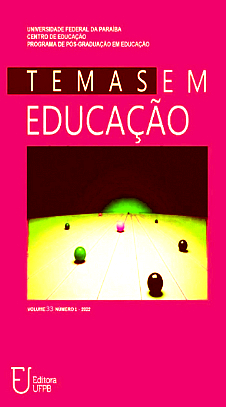NARRATIVES, CURRICULUMS AND AFFECTS
REFLECTIONES ON GAY STUDENTS IN EDUCATIONAL INSTITUTIONS
DOI:
https://doi.org/10.22478/ufpb.2359-7003.2024v33n1.68680Keywords:
Curriculum, University, Difference, Sexuality, GayAbstract
This article interrogated the category of 'curriculum' in the field of sexuality, highlighting the relationship between educational institutions and the affections that can be and/or are experienced and/or produced by gay students in educational spaces that are curricularized. Analyzing the perception of these students, we aimed to relate the curricular practices of these institutions with the affective practices that they experience and/or produce in school life. This is a qualitative and interpretative study, based on the assumptions of narrative research, as well as studies with/of/in everyday life. Without the intention of producing generalizable knowledge to any and all gay students, the reflections in this study allow us to think that schools and universities have qualified and/or made visible knowledge and debates about sex and gender differences in social life and, therefore, , in school life, at the same time that they can limit and/or limit the identity affections of gay students in their educational spaces.
Downloads
References
ALMEIDA, L. L. A juventude universitária e a nova sociabilidade: continuidade ou ruptura? In: Congresso Luso-Afro-Brasileiro de Ciências Sociais. 8, 2004, Coimbra. Anais, Coimbra: Universidade de Coimbra, 2004. p. 1-15.
ANDRADE, S. S.; MEYER, D. E. Juventudes, moratória social e gênero: flutuações identitárias e(m) histórias narradas. Educar em Revista, Curitiba, n. 1, p. 85-99, Mai. 2014.
ARROYO, M. Currículo, território em disputa. Petrópolis: Vozes, 2011.
BRASIL. Resolução Nº 466 de 12 de dezembro de 2012. Dispõe sobre as normas e diretrizes regulamentadoras de pesquisas envolvendo seres humanos. Brasília, Conselho Nacional de Saúde, 2012. Disponível em <https://www.bvsms.saude.gov.br/bvs/saudelegis/cns/2013/res0466_12_12_2012.html>. Acesso em: 23 mar. 2022.
BRASIL. Resolução Nº 510 de 07 de abril de 2016. Dispõe sobre as normas aplicáveis a pesquisas em ciências humanas e sociais. Brasília, Conselho Nacional de Saúde, 2016. Disponível em <https://www.conselho.saude.gov.br/resolucoes/2016/Reso510.pdf>. Acesso em: 23 mar. 2022.
CAETANO, M. Performatividades Reguladas: heteronormatividade, narrativas biográficas e educação. 1. ed. Curitiba: Appris, 2016. 315 p.
COHEN, J. J. A cultura dos monstros: sete teses. In: COHEN, J. J. Pedagogia dos monstros - os prazeres e os perigos da confusão de fronteiras. Tradução de Tomaz Tadeu da Silva. Belo Horizonte: Autêntica, 2000.
COLLING, A. M.; TEDESCHI, L. A. Dicionário Crítico de Gênero. Dourados: Universidade Federal da Grande Dourados, 2019. 748 p.
CORAZZA, S. M. O drama do Currículo: pesquisa e vitalismo da criação. In: IX Seminário de Pesquisa em Educação na Região Sul, GT Educação e Arte. Caxias do Sul, agosto, 2012.
GALHEIGO, S. M. O cotidiano na terapia ocupacional. Cultura, subjetividade e contexto histórico-social. Rev. Ter. Ocup. Univ. São Paulo, São Paulo, v. 14, n. 3, p. 104-109, Dez. 2003.
GROPPO, L. A. Teorias pós-críticas da juventude: juvenilização, tribalismo e socialização ativa. Rev. Latinoamericana de Ciências Sociales, v. 13, n. 02, p. 567-579, Mai. 2015.
HEILBORN, M. L. Entre tramas da sexualidade brasileira. Estudos Feministas, v. 14, n. 1, p. 300-336, Abr. 2006.
JOSSO, M. C. As histórias de vida como metodologia de pesquisa formação. In: HACK, J. L.; FIGUEIREDO, M. X. Experiências de Vida e Formação. Pelotas: Editora UFPel, 2009. p. 55-98.
MOREIRA, A. F. B. Currículo, utopia e pós-modernidade. In. MOREIRA, A. F. B (Org.). Currículo: questões atuais. Campinas, SP: Papirus, 2014. p. 9-29.
NAJMANOVICH, D. O Feitiço do Método. In: GARCIA, Regina Leite. Método; métodos; contramétodo. São Paulo: Cortez, 2003. p. 25-62.
SPOSITO, M. P.; GALVÃO, I. A experiência e as percepções de jovens na vida escolar na encruzilhada das aprendizagens: o conhecimento, a indisciplina a violência. Rev. Perspectiva, Florianópolis, v. 22, n. 02, p. 345-380, Dez. 2004.
UFPel. Institucional. Pelotas: 2023a. Disponível em: <https://portal.ufpel.edu.br/missao-visão/>. Acesso em: 13/12/2023.
UFPel. Mais um passo na luta pela diversidade e inclusão: a implementação de reserva de vagas para travestis e transexuais nos programas de pós-graduação da UFPel. 2023b. Disponível em: <https://wp.ufpel.edu.br/nugen/2021/07/09/mais-um-passo-na-luta-pela-diversidade-e-inclusao-a-implementacao-da-reserva-de-vagas-para-travestis-e-transexuais-nos-programas-de-pos-graduacao-da-ufpel/>. Acesso em: 13/12/2023.
VITAL, R. S. Estudantes gays, cotidianos e Universidade: práticas e táticas na experimentação de si. 2022. 204 f. Trabalho de conclusão de curso (tese) – Programa de Pós-Graduação em Educação em Ciências: Química da Vida e Saúde, Universidade Federal do Rio Grande – FURG, Rio Grande, 2022.
Downloads
Published
How to Cite
Issue
Section
License
Copyright (c) 2023 Revista Temas em Educação

This work is licensed under a Creative Commons Attribution 4.0 International License.
Authors who publish in this journal agree to the following terms:
. Authors retain the copyright and grant the journal the right to first publication, with the work simultaneously licensed under the Licença Creative Commons Attribution that allows the sharing of the work with acknowledgment of authorship and initial publication in this magazine. . Authors are authorized to assume additional contracts separately, for non-exclusive distribution of the version of the work published in this journal (eg, publishing in institutional repository or as a book chapter), with acknowledgment of authorship and initial publication in this journal.
. Authors are permitted and encouraged to publish and distribute their work online (eg in institutional repositories or on their personal page) at any point before or during the editorial process, as this can generate productive changes, as well as increase impact and citation of the published work (See O Efeito do Acesso Livre).



















